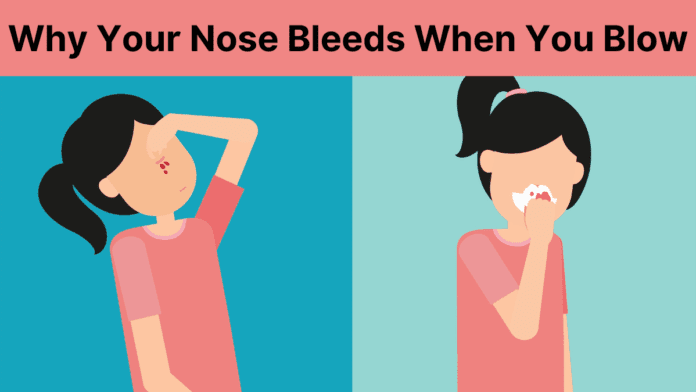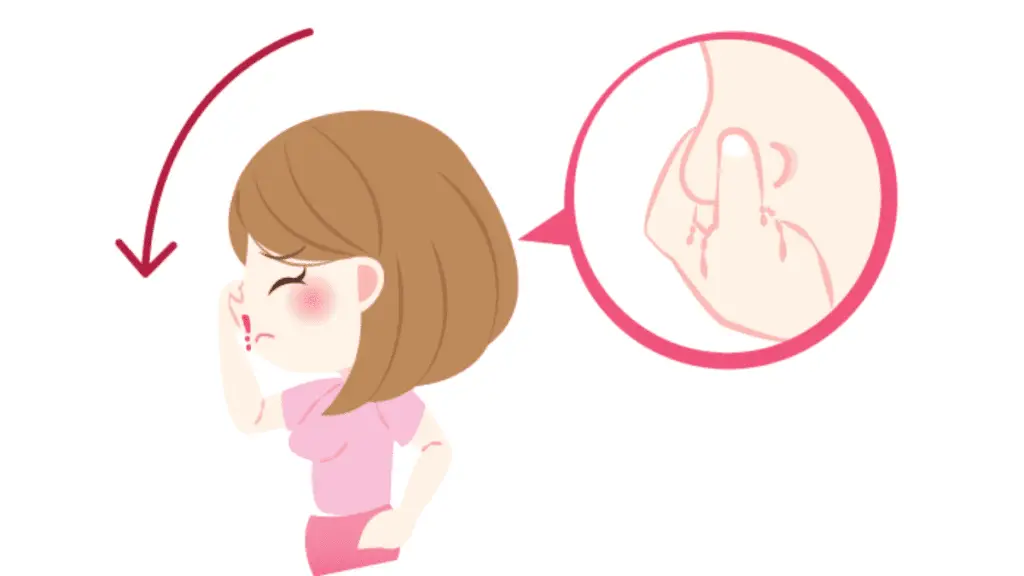
Epistaxis, or nosebleeds, are rather frequent and usually harmless, but they may be an indicator of a more severe problem. Nosebleeds are common and may be frightening experiences for those who have had them. “Why Your Nose Bleeds When You Blow It” It is a question that many people ask. In this article, we’ll discuss what causes a nosebleed and what you can do to stop one when it starts.
Nose Basic Structure
The function of the nose must be understood first. Narrow blood vessels, mucous membranes, and microscopic hair-like structures called cilia make up the nose. The mucus membranes line the inside of the nose to keep it moist and protect it from irritants, and the cilia help filter out dust and other particles from the air we breathe. Nose blood vessels are similarly vulnerable to bruising and bleeding.
Why Your Nose Bleeds When You Blow It
Dry air is a frequent contributor to the development of nasal bleeding. Mucus membranes in the nose might dry and split when exposed to dry air. And if you blow your nose too often or too hard, you run the risk of irritating your nasal membranes and perhaps causing them to bleed. The nose’s blood vessels may become more delicate and bleed easier due to the dry air.
Another reason why your nose bleeds when you blow it is if you have a sinus infection or allergies. Sinus infections cause nasal mucus to thicken, which may obstruct the nose’s tiny blood vessels. If you blow your nose too hard, you may damage these blood vessels and get a nosebleed. Nose irritation and inflammation from allergies may also produce nosebleeds when you blow your nose.
A nosebleed may be the symptom of a more serious medical issue, such as high blood pressure or a blood clotting disease. In certain people with hypertension, the blood vessels in the nose are more prone to bleeding, and as a result, blowing your nose might trigger a nosebleed. The inability of the blood to clot normally after injury to the blood vessels in the nose is another possible cause of nosebleeds in those with blood coagulation disorders.
Extremely rarely, a nosebleed might be an indicator of something more severe, like malignancy. Contact a doctor if your nosebleeds are chronic or frequent.
So, what can you do to prevent or stop a nosebleed?
What follows is a list of suggestions:
- Maintain a humid environment within the house. You may humidify the air by using a humidifier or by keeping a basin of water next to a heating source.
- To prevent nosebleeds, softly blow your nose rather than repeatedly wiping it. Don’t force yourself to blow your nose if you want to prevent bleeding.
- Never pick your nose. Nosebleeds might result from this because it irritates the blood vessels in the nose.
- For those who suffer from allergies, over-the-counter antihistamines may help alleviate nose congestion and itching.
- Do not smoke or be in smoke-filled areas, since this might irritate the blood vessels in your nose and cause bleeding.
There are various things you may take to stop a nosebleed if it does occur:

- Lean forward ever-so-slightly while sitting up straight. The blood will be diverted away from the back of your throat.
- You should close your nostrils and breathe through your mouth.
- Keep the pinch on the nostril for 5-10 minutes, or until the bleeding has stopped, whichever comes first.
- The bleeding should cease within 10–15 minutes; if it continues, get medical help.
Pressing the nostrils shut and breathing through the mouth is a tried and true method for stopping a nosebleed. Doing so helps to put pressure on the blood vessels in the nose, which ultimately helps to halt the bleeding. Hold the pinch for at least 5–10 minutes, or until the bleeding stops, whichever comes first. The bleeding might resume if the squeeze is released too quickly.
Try not to become flustered or blow your nose while holding the pinch. Avoid blowing or smelling your nose until the bleeding has stopped, since doing so might reopen the wound.
It is important to note that while blowing your nose may cause a nosebleed, it is not always the case. The underlying causes, such as dry air or sinus infections, may also lead to nosebleeds without the act of blowing your nose. It is important to address these underlying causes in order to prevent future nosebleeds.
In conclusion, nosebleeds can be caused by a variety of factors, including blowing your nose too hard or too often, dry air, sinus infections, allergies, high blood pressure, and blood clotting disorders. To prevent nosebleeds, maintain a humid environment, blow your nose gently, avoid picking your nose, and address underlying causes such as allergies. If a nosebleed does occur, lean forward and pinch the nostrils closed for at least 5-10 minutes. Seek medical attention if the bleeding persists or if you have frequent or chronic nosebleeds.
You may also like to read: Are Back Pain Injections Safe?











